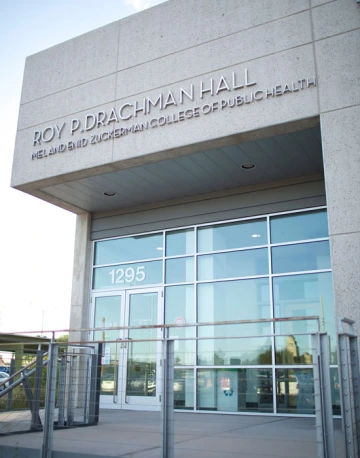Wellness & Health Promotion Practice
Bachelor of Arts
Quick Facts

The only
degree of its kind
in the Southwest.
There are three areas of emphasis in the online Bachelor of Arts in Wellness & Health Promotion Practice: Health Education, Health and Wellness and Aging and Population Health.
The BA in Wellness and Health Promotion Practice develops knowledge, ethics and skills to provide professional service and interventions to culturally and socioeconomically diverse populations. You will walk away with the tools to promote healthy behaviors, healthy lifestyles and a holistic approach to wellness among diverse populations and in a variety of settings.
With a growing emphasis on health promotion and preventative care, new opportunities in wellness-related industries are emerging at a fast pace. Our experiential learning model combines classroom study with practical, hands-on experience. This will enable you to put knowledge into practice and gain the competitive edge you need to advance your career.
The program may involve face-to-face activities during the practicum and internship experiential experiences.
The College of Public Health requires all students to achieve Advanced Standing before completing graduation requirements. Progressing to Advanced Standing in Public Health is currently a non-competitive process that requires a minimum 2.0 GPA and submission of an application declaring a degree emphasis area.
*Residents of some U.S. Territories may not be eligible. Please see our Eligibility & State Authorization page for more information.
You must complete 120 credits to complete this program. Each elective emphasis track consists of 15 credits. The core curriculum for this program includes:
This course introduces and analyzes basic personal and community health, with emphasis on health promotion and maintenance of individual health.
This course uses an interdisciplinary approach that explores elements of diversity, how they work alone and intersect along the life course to shape the individual and group experience of older adults.
Gain an overview of the different sub-disciplines of public health as they are relevant to community health sciences and services at the national, state and local (relevant to the Southwest U.S.) levels.
This course involves ethics and leadership in the profession of health education.
You will cover the field of evaluation, the integrated theory of evaluation and logic modeling.
This course is designed to provide students with skills for application to health behavior and health promotion within public health settings.
This is a faculty-supervised group or individual field-based experiential learning experience in wellness and health promotion.
The required internship reflects preceptor-led, faculty-engaged, experiential learning experiences.
Outcomes
Skills
Earning your Bachelor of Arts in Wellness & Health Promotion Practice will build core skills, including:
- Application of ethical and professional standards in wellness and health promotion settings
- Assessing the needs and the resources of diverse populations
- Effective communication skills
- Measuring wellness and health promotion outcomes
- Planning health promotion and wellness programs for implementation
Potential Career Paths
Graduates of the Wellness & Health Promotion Practice program will be prepared to pursue careers in the following fields:

By completing the BA and selecting the Health Education elective emphasis, you meet the 25 units of public health and health education courses to be eligible for the Certified Health Education Specialist (CHES) exam offered through the National Commission for Health Education Credentialing.
Courses in this emphasis may include:
This course introduces the student to the discipline and profession of health education. Students will examine the concepts of health and wellness, the determinants of health behavior, national health status, the history of health education and health promotion. The student will recognize health education as an important foundation for population-based health care.
How does a changing environment affect human health? What is the public health role in mitigating and addressing these implications? Why is a public health lens both relevant and necessary? Students in this course will directly interact with these questions and explore the fundamentals of global environmental change with a focus on climate change. Course topics include climate change, impacts on human health, policy development, adaptation and mitigation, health equity, and climate action co-benefits.
This course provides an overview and applications of health care marketing theories and methods for health care and public health organizations.

The emphasis in Health and Wellness provides an in-depth curriculum to prepare students for a career in this rewarding field.
Courses in this emphasis may include:
In this course students will learn to create nutrition programs, perform physical fitness assessments, set realistic health goals, build rapport and identify weight management challenges. In addition, this course prepares students for the American Council on Exercise (ACE) Personal Training Certification Exam and the ACE Health Coach Certification Exam.
This course is designed to introduce students to the world of corporate health. It investigates the characteristics of workplace wellness programs, their prevalence, their impact on employee health and medical cost.
Gain a basic understanding of human biology and its role in public health diseases to non-biologists. Major diseases with significant public health relevance will be used to confirm basic biological concepts, taught in each segment’s introductory lecture.

The Aging and Population Health elective emphasis prepares students for career opportunities in human services, government agencies, retirement communities, nursing homes, health care and long-term institutional care.
Courses in this emphasis may include:
Increase your knowledge about how to promote overall health and enhance wellbeing later in life. Learn about health behavior and health belief theories, and tools and practices that can optimize and enrich the lived experiences of older adults. Topics covered include physical and mental health, complementary and alternative therapies, selected health education topics, health promotion and social well-being.
In this course, we explore the relationship between older people and their environment. The goal is to expand knowledge and sensitivity to the subtleties of environmental experience for older persons and challenge us to consider how the development of environmental design, social interventions and public policy can support wellbeing and optimize the lived experience of the aging and aged.
This course provides students with practical information about leadership and principles of management necessary for the successful administration of long-term care facilities.










